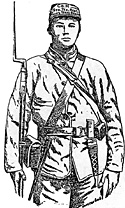Taken from "Personnel of Texas State Government" and "Types of Successful Men of Texas"
 At the age of fifteen, young Chilton was reading law at Montgomery, Texas, under the able instruction of Charles Jones, esq., a distinguished attorney of that place; that is, he clerked in the store of P. J. Willis & Bro., at Montgomery, and at night and odd times, read law. But it seems that fate had not destined him for the Bar, at least not just yet.
At the age of fifteen, young Chilton was reading law at Montgomery, Texas, under the able instruction of Charles Jones, esq., a distinguished attorney of that place; that is, he clerked in the store of P. J. Willis & Bro., at Montgomery, and at night and odd times, read law. But it seems that fate had not destined him for the Bar, at least not just yet.
The dark clouds that had so long presaged a war between the States, finally burst in all its fury, and the country was plunged into strife. As young as he was, one of his impulsive, ardent nature, and in whose veins the patriot's blood was flowing, handed down through several generations of brave ancestors, could not be content to be an idle spectator. At the first bugle call to arms, he responded with alacrity.
A company was soon formed, and he enlisted in it under the command of Proctor P. Porter, an attorney at law, who was elected Captain. The company marched to Red Top, in Grimes County, Texas, and the men were formally "mustered in" to the Confederate service, May 7, 1861. Thence, they went to Harrisburg and went into camp, preparatory to the long march to the seat of war in Virginia.
The march was full of interesting events and scenes, and made a strong and lasting impression on the mind of this young soldier. It was a frolic to him, but many of the old soldiers recall it with a sigh; especially the part of it which led across the "Grand Marie" of Louisiana. His company was christened, "Company H", and it was in the Fourth Regiment of that brigade made famous by the immortal Hood, and known ever after by his name. He served with that command throughout the "Peninsula Campaign," and to the close of McClellan's "On to Richmond Campaign."
After General McClellan was driven from his stronghold there, and forced by Lee's army to seek the sheltering protection of his gunboats, which lay off Yorktown, where he recruited his shattered and disheartened army and General Lee returned to the neighborhood of Richmond, young Chilton was prostrated with a severe attack of malarial fever. His relatives, Hon. W. P. Chilton, an uncle who was at that time in Richmond, a member of the Confederate Congress, and General R. H. Chilton, a kinsman, then in the War Department and afterwards Chief of General Lee's staff, made every effort to induce him to quit the ranks and take a position in the War Department, or preferably to them, to return to his home in Texas and stay with his mother.
But, as we have said, the patriot's blood flowed in his veins; and as feeble and reduced as he was, nearly exhausted, in fact, from sickness, the long and weary marches through the dense and poisonous swamps of those lowlands, and the fatigues of drill and camp duty, for he was not one to shirk a single responsibility, he would not consent to leave his command.
His zeal in his country's cause was unabated, notwithstanding his prostration. His attachment to his comrades was strong; and it was only when, in consequence of repeated spells of fever that he became totally unfit for duty, he listened to the advice of his relatives. McClellan reorganized his shattered forces, and as Lee fell back to Richmond, pursued him. The battle of West Point, or Eltham's Landing, was fought entirely by Hood's Texas Brigade.
The battle of Seven Pines was fought in the water and the Seven Days' battles around Richmond, beginning with Gaine's Mill, have no parallel in history. About this time he received news that his brother, Major Geo. W. Chilton in the Missouri army, had been severely wounded by a shot in the head.
Another brother, Horace B. Chilton, was shot through the heart at Gaine's Mill, and nearly all his regimental and company officers were killed or wounded in the same battle, including Marshall, Carter, Warwick, Key, Porter, Ryan, Lambert, Walsh, and many others of the purest and truest of young Southern chivalry. Their blood was poured out as freely as water, as a libation on their country's altar. It was indeed a time of mourning in Hood's Brigade; and then it was, and only then, that this youthful soldier consented to accept a discharge from the ranks and return home. The battles of Second Manassas and Sharpsburg were both bloody battles that forever wrote the gallantry and bravery of the Brigade imperishably.
Following discharge by Secretary of War, it was brought to him, September 20, 1862, by his uncle, Hon. Wm. P. Chilton, member of Confederate Congress from Alabama, former Supreme Judge of the state.
Back to The Zouave Vol VIII No. 3 Table of Contents
Back to The Zouave List of Issues
Back to Master Magazine List
© Copyright 1994 The American Civil War Society
This article appears in MagWeb (Magazine Web) on the Internet World Wide Web.
Other military history articles and gaming articles are available at http://www.magweb.com